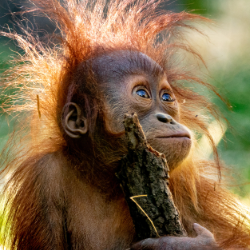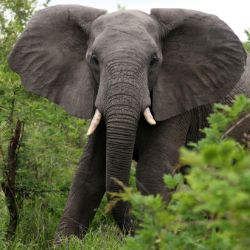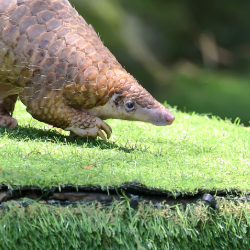Conservation in Indonesia to fight against palm oil expansion
Peatlands, a unique wetland habitat, play an incredibly important role in our planet’s environmental balance. Though they cover only 3% of the Earth's surface, they hold nearly twice the carbon stored in all the world’s forests, acting as vital carbon sinks that slow down global warming. However, these essential ecosystems are under severe threat, particularly in Indonesia, where the expansion of the palm oil industry is rapidly destroying peatlands, turning them into plantation sites.
This shift from natural habitats to monoculture plantations has severe environmental and social consequences. Peatlands, naturally waterlogged and carbon-rich, are drained, dried, and often burned, releasing enormous amounts of carbon dioxide into the atmosphere. Alongside this, the loss of biodiversity, destruction of wildlife habitats, and displacement of local communities are creating long-lasting impacts on the region.
In southern Borneo, a decade ago, these consequences were about to become reality on a large scale. A significant area of peatland was marked for clearance and burning to pave the way for palm oil plantations. This posed a critical threat not only to the environment but also to one of the last wild populations of orangutans in Tanjung Puting National Park, located near the peatlands. The orangutans, already endangered due to habitat loss, faced an even bleaker future.
In response, a conservation effort arose in the form of the Rimba Raya project, a pioneering initiative aimed at protecting these peatlands and the orangutans that depend on them. The project set out to prove that conservation could be more economically beneficial to local communities and government officials than palm oil production, despite the high global demand for palm oil, especially for use in biofuels. This was no small task, as the palm oil industry is a major economic driver in Indonesia. However, Rimba Raya’s innovative approach has demonstrated that conservation can create lasting economic value while preserving natural resources and biodiversity.
The Rimba Raya project: a conservation success story
The Rimba Raya Biodiversity Reserve, covering over 64,000 hectares, was established as a vital conservation area to protect peatlands and wildlife, particularly orangutans. The project works to reduce emissions from deforestation and degradation while promoting sustainable development for local communities. It serves as one of the largest REDD+ (Reducing Emissions from Deforestation and Forest Degradation) projects in the world, meaning it not only protects the environment but also generates carbon credits, which can be sold to companies looking to offset their carbon emissions.
But Rimba Raya’s efforts go beyond carbon credits. The project focuses on empowering local communities with sustainable income alternatives and improving their quality of life. By doing so, it creates a long-term economic argument for conservation, reducing the pressure to convert these lands into palm oil plantations.
Some of Rimba Raya’s key initiatives that have proven to be highly successful include:
1. Training volunteer firefighters
Forest and peat fires, often started to clear land for agriculture, pose a significant threat to peatland ecosystems. When peat burns, it can smolder for weeks or months, emitting harmful greenhouse gases and destroying habitats. Rimba Raya addressed this by training volunteer firefighters from local communities. These teams are now equipped to prevent and respond to fires, protecting both the peatlands and the surrounding villages from devastating fires. This proactive approach has saved countless acres of peatland from destruction.
2. Building libraries to improve literacy
Education is a key pillar of the Rimba Raya project. By building libraries in local communities, Rimba Raya aims to improve literacy rates and provide better educational opportunities for children. These libraries not only promote reading but also teach about the importance of conservation and sustainable living. Over time, this education can shift community perspectives, encouraging a more sustainable relationship with the environment.
3. Supporting egg farming cooperatives
Palm oil plantations offer employment, but often at the cost of environmental degradation and poor working conditions. Rimba Raya introduced egg farming cooperatives as an alternative income source for local families. These cooperatives provide a stable livelihood without the need for destructive land clearing. By offering practical and sustainable alternatives, the project gives locals the tools to move away from reliance on palm oil plantations.
4. Collecting recyclable rubbish
One of the innovative initiatives of Rimba Raya has been to encourage local communities to collect recyclable rubbish, helping to clean up local rivers and villages. This not only improves the environment and living conditions but also provides income through recycling programs. It's a simple yet effective way to instill pride in the local environment and provide a source of revenue for participants.
5. Empowering local craftsmen
Rimba Raya also supports local craftsmen by providing them with the tools and training necessary to create furniture and utensils from recycled wood. This sustainable business model allows artisans to create valuable products from waste materials, offering another alternative to jobs in the palm oil industry. The program helps preserve traditional skills while promoting sustainable resource use.
Collaboration for a greater cause
These initiatives demonstrate that conservation and sustainable development can go hand-in-hand. Recently, CapEQ and Ecologi have partnered to support the Rimba Raya project through corporate donations. CapEQ, known for its commitment to impact investing, has recognized the long-term value in supporting projects like Rimba Raya that not only preserve ecosystems but also create positive economic and social impacts for local communities.
This partnership with Ecologi, a platform dedicated to funding climate solutions, ensures that the Rimba Raya project continues to thrive. Corporate donations play a critical role in scaling such projects, ensuring that the protected area remains intact and that more communities can benefit from sustainable development programs.
The future of peatlands in Indonesia
The Rimba Raya project stands as a beacon of hope in the fight to save Indonesia's peatlands. By protecting these critical habitats and promoting sustainable livelihoods, Rimba Raya shows that economic development doesn't have to come at the cost of environmental destruction. As more companies, governments, and individuals recognize the importance of preserving peatlands, projects like Rimba Raya will play a crucial role in achieving global climate goals.
Through continued support and collaboration, we can ensure that the orangutans, the peatlands, and the local communities not only survive but thrive for generations to come.


